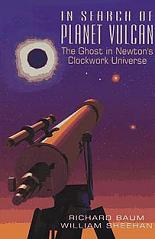
In Search of Planet Vulcan
Richard Baum & William Sheehan
310 pages including index
published in 1997
The classic idea of the universe was that it was geocentric: the Earth in the centre, with the planets, moon and the sun circling around it and the fixed stars as background. Over the centuries that central idea had to be modified with increasingly complex epicycles as the theory had to be adjusted to observational evidence. It was only in the sixteenth century that Copernicus, Kepler and Bruno challenged this Ptolemaic model and replaced it with the truth: that all the planets, including Earth revolved around the Sun. Copernicus was the first to propose this, Bruno would die at the stake for his advocacy but it was Kepler who figured out how the planets revolved and what governed their orbits. more than half a century later Isaac Newton formulated his laws of gravity, joining Kepler's laws with more mundane events on Earth, finally providing a complete model of the workings of the Solar System. From then on, any planetary orbit could be calculated with the right observations and the use of Kepler's and Newton's laws.
except for one. The orbit of Mercury remained, as the subtitle of Baum and Sheehan's book has it, "the ghost in Newton's clockwork universe". Time and again, no matter how carefully the observations were made and how intricate the calculations were, the two just would not line up. Even the best astronomers in the world, with the best observations could not make Mercury's orbit confirm to what it should be according to Newtonian physics. It wasn't until Einstein reformulated the laws of gravity that the reason why became clear. Newton's laws break down near massive objects like the Sun and although "good enough" for most situations, Mercury's orbit was just too close to the Sun and Newtonian physics just wasn't accurate enough. Of course, until Einstein found the real answer, astronomers sought for other explenations for Mercury's wrong orbit -- and the most likely candidate was an undiscovered planet even closer to the Sun: Vulcan.
In search of Planet Vulcan tells the story of how the irregularities in the orbit of Mercury were discovered and the search for the cause began, which seemed to end in 1859 when the amateur astronomer Edmond Modeste Lescarbault thought he had detected it traversing the Sun. Other astronomers would also claim to have seen it in the decades since, with its existence championed by the most celebrated French astronomer of his time, the man who "discovered planets from his desk", Urbain Jean Joseph Le Verrier. Le Verrier achieved fame for deducing the existence of Neptune, based on its effect on the orbit of Uranus, until then the most distant planet known to exist. It was he who proposed the existence of Vulcan in the first place, so it's no wonder he continued to believe in its existence, even though evidence after that first sighting remained slender. If it was Einstein who removed the need for a Vulcan, doubts about its existence had cropped up long before him, as sightings of it proved elusive. Unlike Neptune and Uranus, which were easily found once their existence became known, Vulcan was hard to find, even during prime observation times like Solar eclipses and when it was sighted the reports were often vague and inconsistent with each other. Yet it was seen often enough to be believed in by at least some astronomers, until finally the need for it disappeared with Einstein's theories.
Baum and Sheehan place the Vulcan sightings in the context of the discoveries of Uranus and Neptune, explaining how the belief in the infallibility of Newtonian physics drove the search for an external cause for the discrepancies between the calculated and real orbits of Mercury. Which means that the "discovery" of Vulcan doesn't take place until halfway through their story, only after they explained how Neptune had been discovered. This broad view not only keeps the story interesting, it's also indispensible in explaining why and how the belief in Vulcan arose and could continue for so long despite so little evidence for its existence. On the whole In search of Planet Vulcan manages to strike the proper balance between focus and context very well, neither dragging in the entire universe nor leaving out anything of relevance.